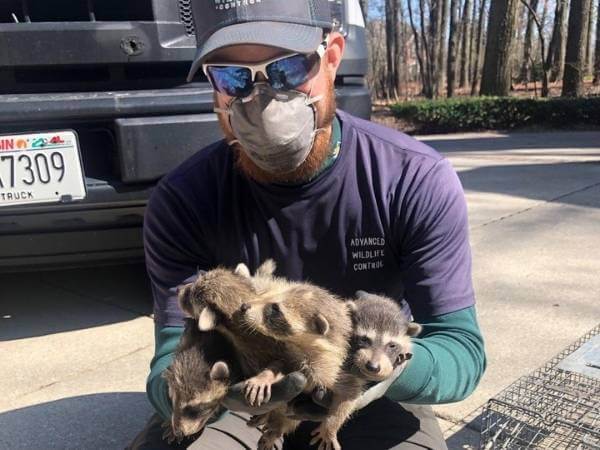Reclaim Your Property: How to Get Rid of Raccoons in WI
When raccoons take up residence on your property, they can be highly destructive and problematic to deal with. Eliminate trial-and-error and countless hours spent researching how to get rid of raccoons. Instead, look to Advanced Wildlife Control Inc.’s raccoon services in Ozaukee County, Milwaukee County, Washington County, and Waukesha County.
Identifying a Raccoon
Raccoons may be cute from a distance, but up close and personal, they are anything but. These stocky mammals are black and gray with distinct, stripped markings, a black-masked face, and bushy, ringed tails. Raccoons measure between two to three feet in length and weigh around 10-20 pounds, mirroring the size of a small dog or housecat.
Are Raccoons Nocturnal?
Raccoons are highly intelligent, nocturnal creatures notorious for following their curiosity into residential trash cans, coining their iconic alias, “trash panda.” They have incredibly skilled front paws that act just like human hands. Their unique five-fingered hands grant them unparalleled coordination, facilitating their ability to rummage through garbage in a way other animals cannot.
What Do Raccoons Eat?
As scavengers, raccoons aren’t picky about their diet, making them adaptable. As a result, they can be found anywhere from coastal areas to forests and urban sprawls. They enjoy nuts, insects, worms, fish, corn, fruits, and reptile and bird eggs, but they're more than willing to eat any leftovers in residential trash cans.
When Do Raccoons Mate?
Raccoon mating season spans from January to March. Once impregnated, female raccoons will seek out a safe, elevated shelter to give birth and care for their young. This may take place in a natural location, such as a tree, or inside attics or chimneys.
How Many Babies Do Raccoons Have & When Do Raccoons Have Babies?
Female raccoons can give birth to 2-6 babies. They typically give birth between mid-March and early May. Baby raccoons open their eyes 23 days after being born and remain with their mother until the autumn or even through the winter before going off on their own.
The Relationship Between Humans & Raccoons
Raccoons have become common in cities across the United States. Living among humans has resulted in raccoons losing their fear of humans. Instead, these smart pests have discovered a way to take advantage of this coexistence by allowing themselves unlimited access to residential garbage, gardens, and structures, creating a major issue for people.
Are Raccoons Dangerous?
Despite their discernment for living among humans, raccoons pose severe risks to properties and people. When they seek shelter inside homes, raccoons are known to scatter trash, tear up landscaping, and destroy structural components. In addition, they often carry various diseases that can be transmitted to people and pets.
Are Raccoons Hard to Get Rid of?
If you have a raccoon living on your property, removing it yourself is highly hazardous, especially if the raccoon has babies. Although the DIY approach to raccoon control is not impossible, it's not recommended. To eliminate health and safety hazards, look to Advanced Wildlife Control Inc.
Health Risks Associated With Raccoons
Raccoons are a severe threat to humans and pets. These animals are notorious for carrying a number of diseases, and even their feces are known to carry damaging eggs that can lead to serious illness. The health and safety risks associated with raccoons include:
- Rabies
- Canine distemper
- Roundworm (found in raccoon feces)
How to Get Rid of Raccoons
A messy raccoon is a nuisance but may not be an immediate concern. In contrast, a raccoon with rabies is considered an emergency. Depending on the urgency of the situation, raccoon removal methods may include:
- Raccoon trapping
- Exclusion
- Raccoon repellents
- Eliminate food and shelter sources
Professional Raccoon Removal
Advanced Wildlife Control Inc. specializes in humane raccoon removal, live trapping, and exclusion. Our live trapping effectively captures the raccoon without harming it, allowing us to relocate it far from your property. We follow up our removal process with exclusion techniques to seal entry points and prevent the return of these unwanted houseguests.
Getting Rid of Raccoon Feces
Raccoons will choose one area to use as a communal defecation spot, also called a raccoon latrine. Unfortunately, if the raccoon latrine is on your property, you’re subject to significant health risks due to the harmful contaminants found in the fur, feces, and urine. That's where Advanced Wildlife Control Inc. comes in to clear up this dangerous mess.
Raccoon Feces Cleaning & Restoration
Our pest professionals at Advanced Wildlife Control Inc. are here to safeguard you from the risks associated with raccoon feces and contaminants. We are fully equipped to remove and deconstruct raccoon latrines using a professional-grade decontaminating agent. Our process is safe and effective, eliminating the risk of cross-contamination.
Schedule Your Raccoon Control With Us
For time-honored raccoon control solutions in Ozaukee, Milwaukee, Washington, and Waukesha Counties, look no further than Advanced Wildlife Control Inc. We’re here to rid your home of these destructive pests with prompt and effective services that safeguard your comfort, health, and safety. Contact us today to get started.




